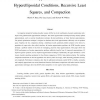Free Online Productivity Tools
i2Speak
i2Symbol
i2OCR
iTex2Img
iWeb2Print
iWeb2Shot
i2Type
iPdf2Split
iPdf2Merge
i2Bopomofo
i2Arabic
i2Style
i2Image
i2PDF
iLatex2Rtf
Sci2ools
121
click to vote
TEC
2008
2008
Function Approximation With XCS: Hyperellipsoidal Conditions, Recursive Least Squares, and Compaction
An important strength of learning classifier systems (LCSs) lies in the combination of genetic optimization techniques with gradient-based approximation techniques. The chosen approximation technique develops locally optimal approximations, such as accurate classification estimates, Q-value predictions, or linear function approximations. The genetic optimization technique is designed to distribute these local approximations efficiently over the problem space. Together, the two components develop a distributed, locally optimized problem solution in the form of a population of expert rules, often called classifiers. In function approximation problems, the XCSF classifier system develops a problem solution in the form of overlapping, piecewise linear approximations. This paper shows that XCSF performance on function approximation problems additively benefits from (1) improved representations, (2) improved genetic operators, and (3) improved approximation techniques. Additionally, this pa...
| Added | 15 Dec 2010 |
| Updated | 15 Dec 2010 |
| Type | Journal |
| Year | 2008 |
| Where | TEC |
| Authors | Martin V. Butz, Pier Luca Lanzi, Stewart W. Wilson |
Comments (0)

